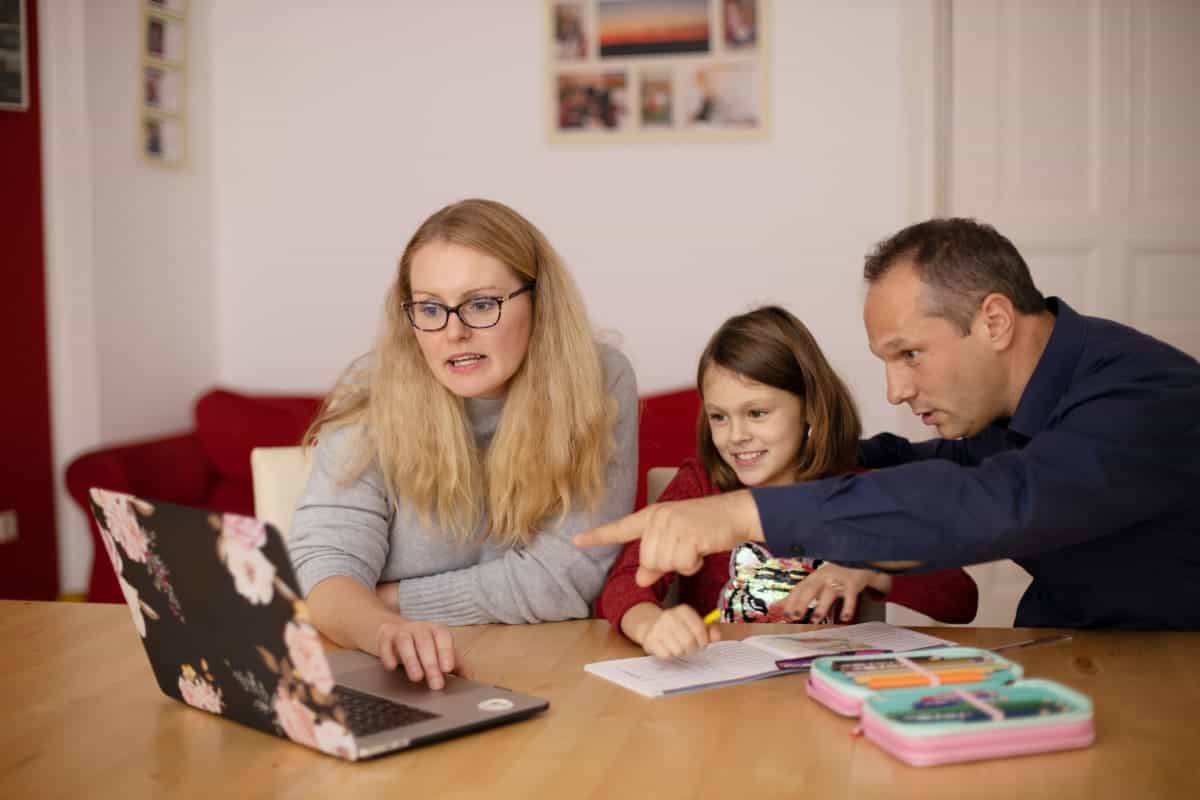Raising children is immensely rewarding. But even when both parents remain at home, parenting can be incredibly challenging as well. Divorce can make successful co-parenting difficult to navigate. Co-parenting arrangements involve several factors ripe with the potential for conflict and disagreement.
There are so many things to juggle when pursuing effective co-parenting. Some of these include:
- Parenting styles
- School events
- Extracurricular activities
- Child support payments
- Your co-parenting plan
- Extended family
- Parental conflicts
- Mental health
- Dynamics of blended families
- Major decisions
- Special events
- Shifting family relations
- Family finances
- Long-term health
- Daily decisions
- Building and maintaining a foundation of respect in your children
- Helping kids navigate the grief process
- Building a sense of stability
- and so much more.
It’s important to remember that you’ll never do it all perfectly. Focus on learning what you can. Stay engaged with others. Seek support from those who care about you, and partner with a good family therapist and child psychologist to gain the wisdom, tools, and strength you need to parent well every day. You’ll need all these, especially in the weeks and months following divorce.

Benefits of a Healthy Co-parenting Relationship for Your Children
A more peaceful and amicable experience is only part of good co-parenting. It will be your children who experience the most positive effects from your co-parenting efforts, and the most negative, when your co-parenting work doesn’t go well. Some benefits of healthy, successful co-parenting for your kids include:
Stability and Security
Children need a sense of stability and consistency, especially in the earlier years. Healthy and effective co-parenting creates living situations, schedules, habits, resources, provision, and family times that establish the security and stability your child requires for a healthy life.
Children can handle more change than we give them credit for. But for this to happen, they need to know that certain things are solid, that they can count on certain habits, rules, activities, and mainly, that they can count on your consistency as a mother or father in the way you lead, teach, discipline, provide for, protect, and encourage them.
Effective Problem Solving
Children who get to watch their parents work together peaceably, reasonably, and creatively through conflict and trials have a great model to work through their own problems and relational conflicts with the same clarity and mindfulness.
Mental and Emotional Health
Children with parents who have a lot of co-parenting issues experience more depression, anxiety, ADHD, and social conflicts. Children with healthy divorced parents who work well together in respect experience greater health, less mental and emotional distress, and often, an easier time in social circles.
A Good Example to Emulate
Positive co-parenting strategies and mutual respect will give your kids a great example to look up to. They need affirming models of healthy adults to learn from. The best place to begin is in your own home.
When they grow up around parents who treat each other with respect, who listen well, communicate clearly and kindly, and work together to solve problems, they are more likely to behave the same way as they grow into adulthood.
Now, let’s look at 3 tips for healthy co-parenting after divorce and prepare you for the challenges and rewards ahead.
1. Be a Team
Each of you will have your own ways of approaching parenting in your own home. Yet, it’s important that you work closely to establish habits, similar rules, and some commonality in discipline and communication. This will help your son or daughter experience more stability and consistency. Areas in which the two of you should try to find some consensus, include:
Scheduling: Aim for consistency in pickup and drop-off times, bedtimes, and other activities.
Discipline: Each of you will handle this in different ways. But if you can work together to use congruent discipline habits that both of you can agree upon, it will allow your child to learn certain lessons with greater ease, and not feel out of balance moving back and forth between drastically varied discipline styles.
Also, respect one another’s discipline choices. If one parent initiates a certain punishment for good reason, honor this in your home too, whether it be limiting media, time with friends, toys, or other privileges. This consistency will help your child understand this process and their personal journey much better.
Rules: House rules are going to vary. This is normal. Do what you can to communicate and understand each other’s rules and support one another where you can.
Freedoms: This is another area that will be unique from home to home. Each parent has the freedom to make their own choices in this regard. Again, try to work together to better understand these differences and be willing to make certain compromises or allowances from time to time for the sake of your child’s health and maturity.
2. Ease Transitions and Visitation
Children of divorced parents have to deal not only with a lot of change initially, but later on, the trials and frustrations of frequent movement. The two of you can take steps to alleviate some of the difficulties involved in transitions. Consider the following:
Pack Ahead of Time
Help your kids pack ahead of time (depending on their age). This will save time, reduce stress, and teach them to prepare earlier for everything in life. Make it fun. Don’t forget important items like favorite stuffed animals or articles of clothing.
It’s also a good time to teach your young ones about being conscious of things like changing seasons or special events, each requiring their own kinds of clothing.
Anticipate and Discuss Changes
Talk with your child about an upcoming pickup or change. Discuss the good things they will do, what they’re looking forward to, and any concerns they may have.
Perception Matters: Drop Off or Pick Up
If possible, it’s better to have the parent currently with the child drop their son or daughter off at the other parent’s house instead of having the next parent pick them up. This may be subtle and its effects mostly unconscious, but it makes a difference. It’s better that your kids see and feel they are being taken to their new parent and not taken from the current one.
Upon Return
There are also some good practices to remember when your child returns home.
Allow Some Space
It’s always a bit of an adjustment when they return to your house. If they seem to want or need it, give your kids some space when they first return. This will help them relax and re-acclimate to the home and atmosphere.
Take It Easy
There is a tendency to overdo things when your child first returns to your home. You’re excited to have them back and often jump into asking them all kinds of questions about their time away, their activities, what they ate, who they saw, how they slept, what they watched, if they experienced any conflicts. This can be overwhelming for your child and it isn’t necessary or healthy for anyone.
Take It Slow
Enjoy some downtime together. Play a game, read a book, make a meal together. Let things come naturally.
3. Focus On Communication
Much of the success you eventually experience in co-parenting stems from the quality of your communication. Remember that your top priority with communication is your child’s maturity, stability, and well-being. It isn’t about arguing, proving a point, or gaining power over your ex.
Listen
Listen, listen, listen. It’s easy for each of us to talk a lot, but listening well is a skill that will serve you in every part of life. Cultivate a mutual habit of listening first. Take time to understand one another’s perspective and then work to solve problems based on what you’ve learned from each other.
Make Requests Not Demands
A lot of divorced parents try to command the parenting relationship by demanding their ex do this or that, or change something to fit their preferences. This is not only wrong, but damaging to everyone involved.
Instead, respectfully request certain things. “May we try…?” “What do you think about…?” Would you be willing to…?” What if we tried this…?” Would it work for you if we…?”These are all good starters for conversations about possible changes.
Keep a Civil Tone
Frustrations are going to happen. Try to keep a civil, respectful tone and presence when talking with each other. Discuss things without passive aggression, sarcasm, or mockery. Avoid terrible habits like eye-rolling, turning away, interrupting, and shouting.
Keeping your discourse straightforward, honest, and decent will help the two of you communicate more effectively, find solutions quicker, and give your kids a great example of healthy communication.
Communicate Regularly
Don’t go too long without talking. Agree to meet in-person or talk by phone (not just email and text) at certain intervals. Use this time to discuss things like schoolwork, outside activities, friends, upcoming events, and more. Beyond this, though, use it to discuss the deeper things, like your child’s emotional world, their struggles and concerns, their hopes and dreams and more.
Also, these are good times for the two of you to work out conflicts you have with one another privately, without the possibility of your child overhearing.

Set Your Hurt Aside
Don’t use your child as a sounding board for your frustrations with your ex. Never put them in the middle of your conflict. This confuses and hurts them and makes them feel as if they need to choose sides. If you need to vent, talk with your counselor, your best friend, your brother or sister.
Don’t make your kids carry messages back and forth. Leave them out of conflict or adult communication. Talk with your ex directly about all relevant matters without involving your child in this potentially conflict-ridden situation.
In Closing
Successful co-parenting takes work, but it’s not an impossible task. It takes patience, compromise, respect, confidence, open lines of communication, and honesty. Don’t forget that your top priority is your child’s well-being.
Find ways to decrease fighting and unnecessary conflict between you and your ex. Don’t fight in front of your child, or vent to them about your frustrations. Listen well; meet and talk regularly, and always speak well of your ex with your children.
Consider working with a family therapist to gain more skills and confidence in your parenting choices. Take co-parenting classes and engage in family mediation. Finally, surround yourself with those who care about you and want your child’s best.
Torrone Law helps families find peace of mind and resolution during divorce, adoption or custody hearings. Connect with us for a consultation and find out the difference Torrone can make in your life.
To learn more about co-parenting after divorce, check out our frequently asked questions below.
FAQ
How does healthy co-parenting affect my kids?
Successful co-parenting provides so many benefits for your children, including:
- Peace of mind
- Stability
- Better mental and emotional health: less depression and anxiety
- Greater ease in social situations
- Problem solving skills
- An example to look up to
- Healthier relationships
- Mature communication habits
- More Confidence
How much should I work with my ex?
The short answer is…a lot! More specifically, your child’s well-being is the most important thing here. Work with your spouse to communicate regularly and with respect, and good listening habits. Work out conflict calmly and away from your child so they don’t see the worst of it. Speak well of your ex in front of your child and encourage their relationship with your ex.
Make a habit of honoring one another’s house rules whenever possible. Discuss activities, discipline styles, your child’s education, health, friendships, and future. The better your relationship with each other, the healthier and more stable your child will be.
Is it okay to vent my frustrations about my ex to my child?
Bad idea. Don’t ever use your kid to vent your anger. It confuses them and often compels them to take sides, which is never good. Your frustrations and hurts are real. But there are plenty of good or qualified people to talk to, including your counselor, mentors, community leaders, close friends and family.
How do I make transitions easier for my children?
Take your child to your ex’s house instead of them picking up your kid, and vice versa on the return trip. It’s often better for your child to be taken to the next home than taken from their present one. It’s a subtle difference, but it is a different feeling.
Pack ahead of time and make it fun.
Talk with them about the things they’re excited about when they go to see their other parent.
Take it easy when they return. Don’t rush into asking them endless questions. Just enjoy your time together. Let them ease into talking about their time away when they feel up to it.
Prepare them by talking about their upcoming transition a few days ahead in an easy-going and positive manner.







